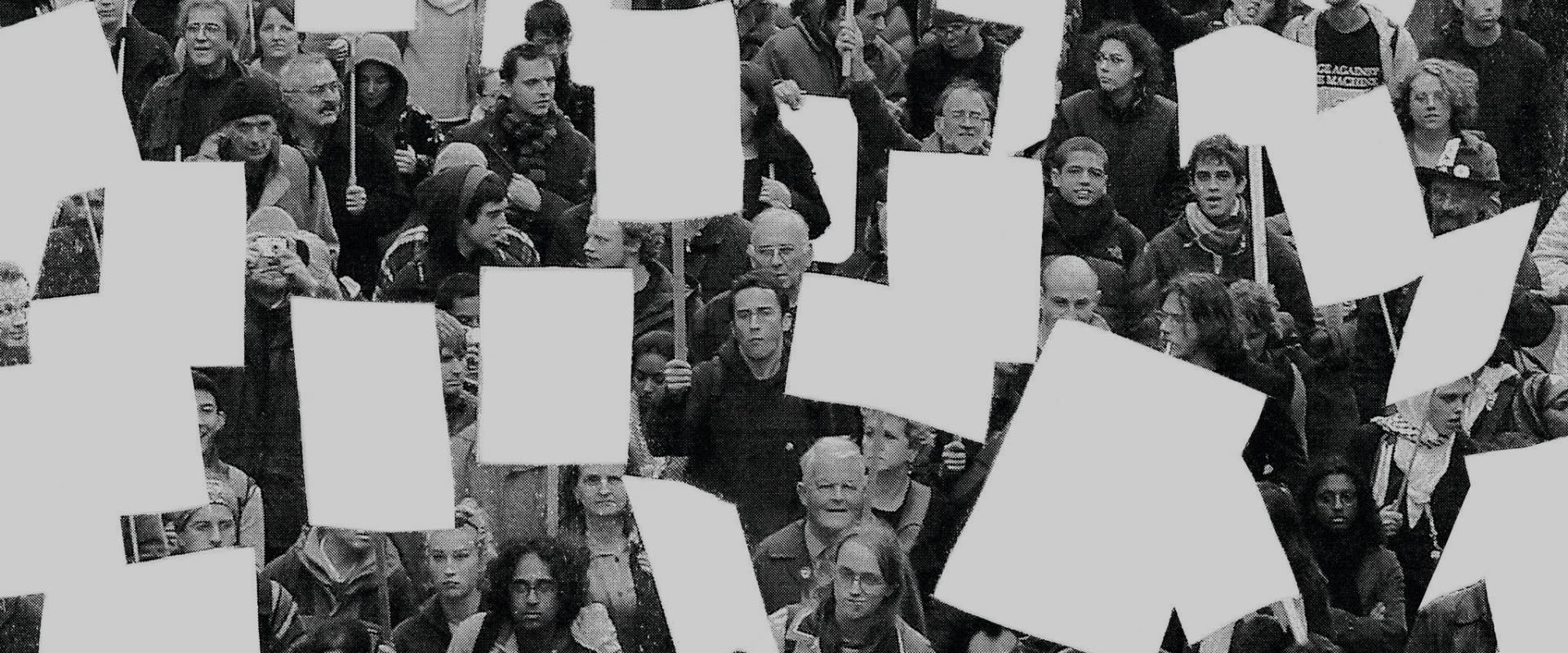What kind of party do we need?
Or what kind of party should revolutionary socialists be focused on building? I want to propose some answers to the organizational questions we’re facing. But more than that, I want to invite those who are asking the same questions to commit to answering them together in the coming months and years.
In short, we should not be focused on building a labor party, a broad left party, or an electorally focused party. Some think they already are the party we need and all they need to do is gobble up the other pretenders to the throne. Anarchists and movementists reject the idea of party altogether. So do base-builders and those drawn to building vague “infrastructures of dissent,” to use a phrase popularized by the new book, Revolutionary Rehearsals in the Neoliberal Age. Both mistake tasks of the class for those of revolutionaries.
As one of our predecessor organizations, the International Socialist Organization was collapsing, Hal Draper’s critique of “the micro-sect” was set off like a bomb to finish the job. It vilified the fundamental Marxist approach of organizing around a shared politics of some specificity. Questions raised by the rape and abuse in the ISO, as well as the pressures of opportunism, went beyond how to prevent such horrors in our organizations to whether we should enter a reformist socialist organization as scattered individuals, whether we should organize on a political basis, or whether we should organize at all. Many comrades came to question Leninist basics… as if Lenin himself covered up the rape!
We need to go where the struggle is. We need to build on the rebellious elements in workers’ consciousness and try to win the best fighters to a Marxist perspective. The forefront of class struggle today is in social movements, where people are coming into motion over political issues. The people most open to Marxism will be found in these movements.
So, it must be affirmed that we need a revolutionary socialist vanguard party. Its necessity derives from features of class society and human consciousness that remain unchanged since such a party was conceived and tested by the Bolsheviks. These features include: the hegemony of the bourgeois ideology, the uneven development of consciousness within the proletariat, the centralized power of the capitalist state, and the treacherous role of reformism.
On vanguardism
While vanguardism is widely misunderstood and misapplied, there is a truth at its core that is undeniable: revolutionaries need a fighting formation to fight the ideas of the bourgeoisie, and eventually to fight the bourgeoisie and their lackeys, quite literally. It is true that the level of struggle and class organization is low, that there is no existing vanguard, and that Firebrand is far from a party at this stage. But that does not relieve us of our responsibility to relate to and organize with the most politically conscious sections of our class.
Class struggle can and should be advanced by organized socialist intervention. We must take a political lead. We must avoid lowering our politics to the lowest common denominator. Instead we must fight to raise the politics of others. We should not be ashamed to compete for influence in every fight we can get into. We don’t know everything, but solid Marxist politics can illuminate every issue and turbocharge every fightback.
Wielding the Marxist toolset
We need a revolutionary organization dedicated to wielding the Marxist toolset for understanding and changing the world. It needs cadres trained in theory and action, and politically developed enough to carry Marxist methods and arguments into every fight. It must be large, radically democratic, and represent all sections and identities of our class. It needs permanent persuaders, activist-writers and activist-speakers, a big sexy profile, and a reputation as the best fighters. It needs vibrant publications that are subordinated to it, not the other way around.
Today there are thousands of Marxists and many more potential Marxists who don’t know what to do. It is imperative for developed Marxists to get off the sidelines and into the fray — not just as movement activists, but as open Marxists actively working toward revolution. The current rise in interest in Marxism has been accompanied by a decline in Marxist organization. The crisis of Marxism in the U.S. today is a crisis of organization! However, we cannot just snap our fingers and create it.
Ultimately, we need a combat party fit for the task of seizing power. Such a party cannot be built in the absence of widespread radicalization and the organized intervention of Marxists. We have no control over the first condition and must dedicate ourselves to the second.
We need national organization, but we must organize locally in the meantime. Local groups can start as little more than study circles that go to protests together. These can form the basis to recruit and develop cadre through propaganda, political education, and social movement and labor activism.
As the first step toward national organization, we need to create a framework for local groups to provide mutual support, clarify our ideas, and coordinate action. We’re currently trying to do this through Firebrand.
Political unity
What is the right level of political agreement for our current context? Some of the divisions between Marxists can be contained within a single organization, others are too fundamental.
An organization that is too narrowly defined will not attract enough members, nor foster the vibrancy necessary to develop self-confident, critically thinking cadre. Similarly, rather than fixating on crafting the perfect program for a particular movement, we should ask ourselves: What demands and approaches will get more people actively involved and provide a basis for further action? This is based on the idea that people learn best in struggle, not by being convinced of an abstract, overly detailed program.
On the other hand, a revolutionary organization that papers over the issues that have rightly divided Bolsheviks from social democrats, Stalinists, Maoists, and anarchists only entangles itself in interminable debates and precludes effective activity. We need a coherent politics and methodology.
Firebrand has developed and formed around points of unity we consider fit for this moment. First and foremost, we uphold the Marxist principle of class independence. That leads us to consider the Democratic Party a permanent and decisive impediment to class-consciousness and class-organization, not a path to it. We seek confrontation with the state, not capture of it. We orient on class struggle and rupture, not electoral gains and gradualism. We oppose all imperialisms and take the side of the international proletariat against “their own” ruling classes. We reject campism and the logic of “the enemy of my enemy is my friend.”
We take an abolitionist stance on the police, military, prisons, and borders. In the fight against oppression, we connect it to the fight against exploitation, while rejecting the twin pitfalls of class-reductionism and separatism. We fight for socialism from below and will settle for nothing less than the self-emancipation of the working class. And we advocate for a revolutionary party to accomplish it.
Strategy
In addition to political agreement, an effective revolutionary organization needs to agree on strategy. We need “more than a mere collection of individuals giving general adherence to a platform,” to quote Duncan Hallas, but “a centre for mutual training and debate, for raising the level of the raw activist to that of the experienced.”
We should seek every opportunity to demonstrate our politics in action, but until we build the capacity to lead major struggles, we must recruit primarily on the basis of our ideas. We’re better off admitting that, as Mick Armstrong cautions in From Little Things Big Things Grow.
If we look at the history of the socialist movement, we can see that one of the key reasons why so many small revolutionary groups came to grief is that they overestimated their own capabilities and greatly exaggerated their ability to influence struggles or campaigns. All too often they attempted to leap over the stage of development dictated by the balance of forces between bosses and workers and the limitations imposed by their own small size. They were too impatient. … Similarly, small groups of socialists who declare themselves to be “activist groups” or parties are deluding themselves. Because of their small size, they remain propaganda groups, whatever they think they are. But they are confused propaganda groups and therefore a lot less effective than they could be.
We need to go where the struggle is. We need to build on the rebellious elements in workers’ consciousness and try to win the best fighters to a Marxist perspective. The forefront of class struggle today is in social movements, where people are coming into motion over political issues. The people most open to Marxism will be found in these movements. Eventually we need to be implanted in strategic industries, but it is heightened struggle, not a few dozen artificially implanted socialists, that changes consciousness and provides an opening for our ideas.
Our experiences
These perspectives were developed in concert with my closest comrades in the Denver Communists; Seattle, Boston, and Central Ohio Revolutionary Socialists; the Revolutionary Socialist Network, and Firebrand. They come from years of discussion and our collective experiences—especially since the ISO collapsed, when we have had to figure out how to proceed and what to keep and reject from our past.
After the collapse of the ISO, the Denver branch refounded almost immediately as the Denver Communists, on the same political basis we had been recruited to. We also adopted a “guilty until proven innocent” policy on accusations of sexual assault. A core group of six remained and we’ve since built a membership of 33.
We’ve been active in anti-racism, anti-fascism, and the fights for immigrant, abortion, and trans rights, but I’m proud to say the center of our work has been political education via weekly meetings on revolutionary socialist theory, history, strategy, and tactics. We’ve managed to develop some political clarity and avoid getting lost in the swamp of reformism, eclecticism, movementism, mutual-aidism, anti-organizationalism, and the romanticization of illegality. The siren song of the ballot box has fallen on deaf ears.
Nobody’s around to tell us not to be so mean to social democrats anymore. We present ourselves as bold, brash, loud and proud Marxists, Leninists, and Trotskyists. Though coalition and campaign work can require a softer touch, we take unapologetically hard-left positions, without worrying too much about having mass appeal. We raise the red flag like the Bat-Signal and see who responds.
Our current challenge
In the movement of the present, we must also represent and take care of the future of that movement. We basically have to build a locomotive while it is already hurtling down the tracks. We need to build a national organization, while also building locally. We need to incubate locals across the country, reactivate our unorganized former org-mates, and figure out how to integrate contacts from cities without locals.
I think we’re caught in a predicament between “build it and they will come” and providing an opportunity for comrades to “get in on the ground floor.” It’s why we helped found a network and an organizing project and organized a conference and a coalition: to take a step forward toward revolutionary organization, while encouraging others to take the next step together with us.
This article is adapted from a talk given by Radek at the Revolutionary Socialism Conference in June of 2022.
Illustration by James Radek.



